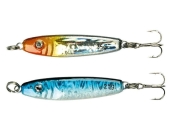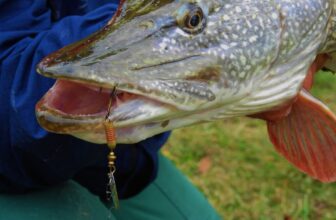Pollock fishing – much like bass fishing in the UK – is true sport fishing. They’re aggressive, hard-fighting predators that reside in truly deep, kelpy water that can be caught on lures from the shore, with bait or from boats.
Their most prominent feature – huge, dark eyes – are designed to take in as much light as possible, making them effective hunters in lower light conditions. Pollock are less affected by the tide than bass because they don’t venture into the shallows – at least not frequently – so they can be fished at most times of the day. However, focusing on the hour before and after high tide will likely yield the best results. You can find more of our pollock fishing tips here.
As the fish go offshore to spawn in the colder winter months, the best time to fish for them tends to be late summer and early autumn. This is when pollock are in aggressive ‘eat anything and everything’ mode pre-spawning.
Table of Contents
Can you catch pollock in the UK?
Yes, you can catch pollock in the UK. Pollock are almost omnipresent throughout the UK, particularly in deep waters that are rife with structure and kelp. These bottom-dwelling fish hunt for smaller baitfish like sprat, mackerel and sandeels that are all almost ever-present in UK waters. Hence pollocks success.
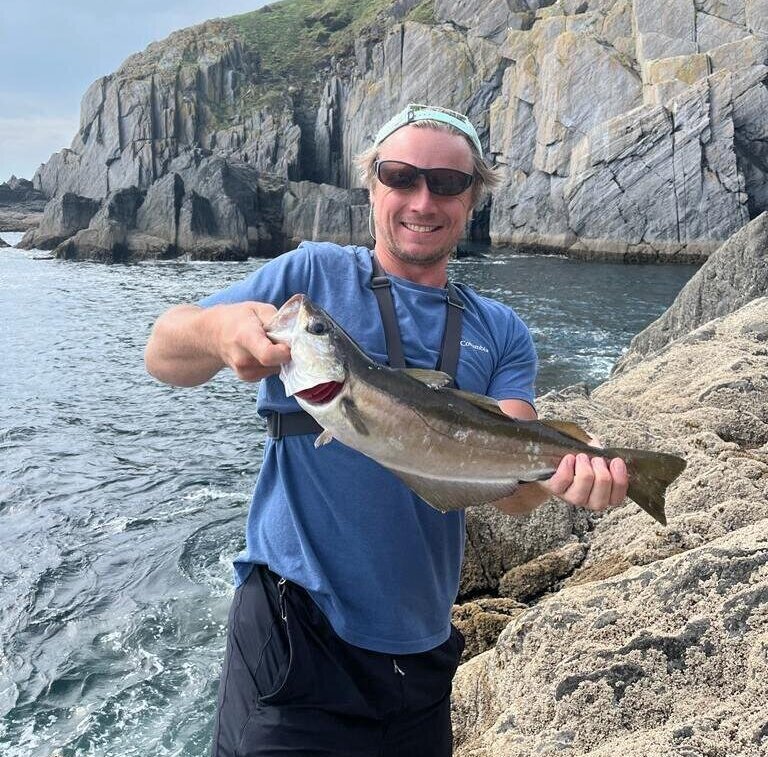
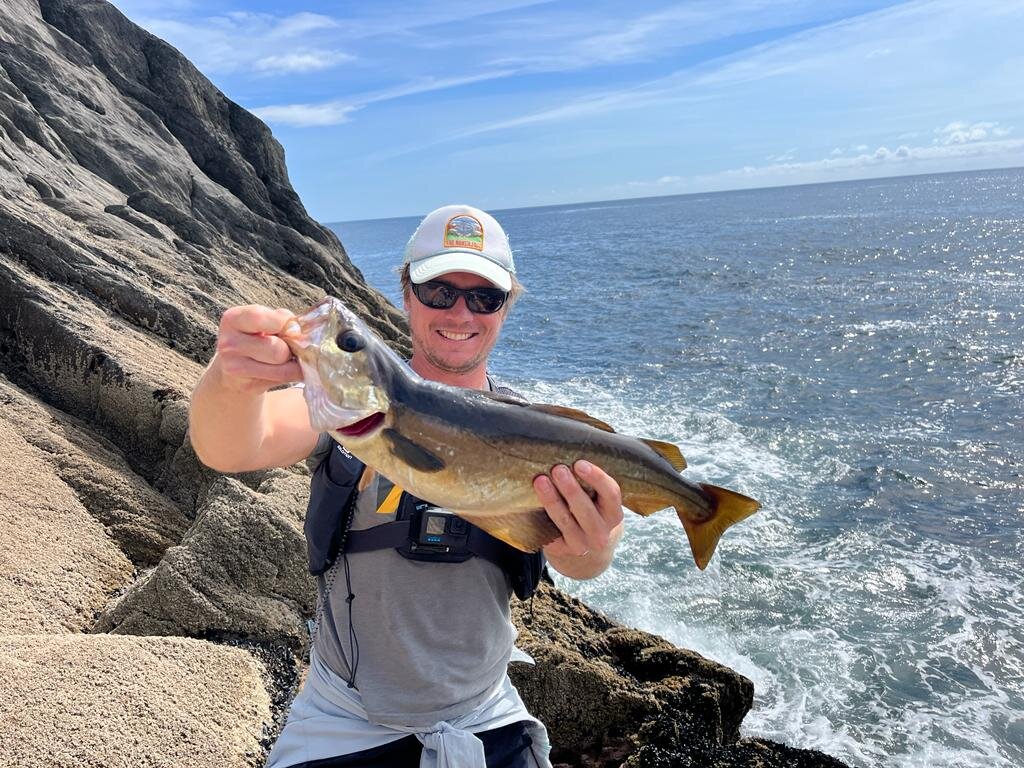
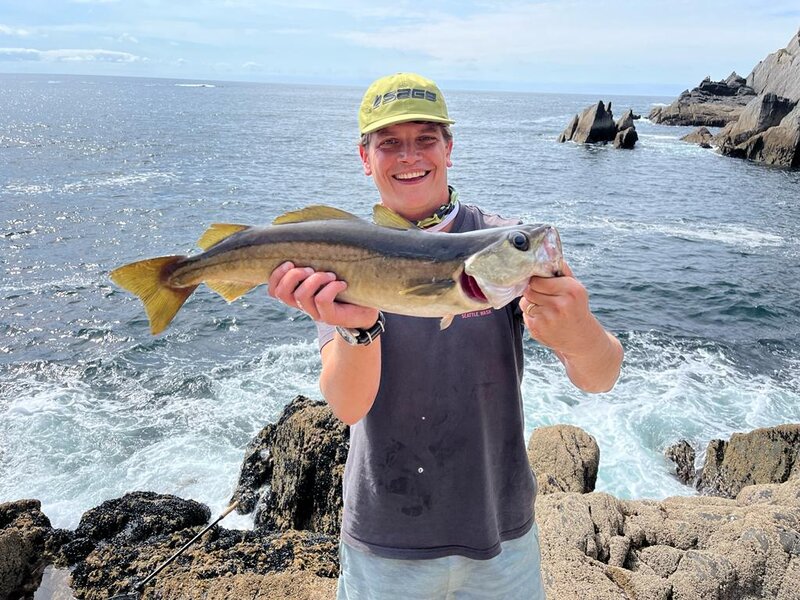
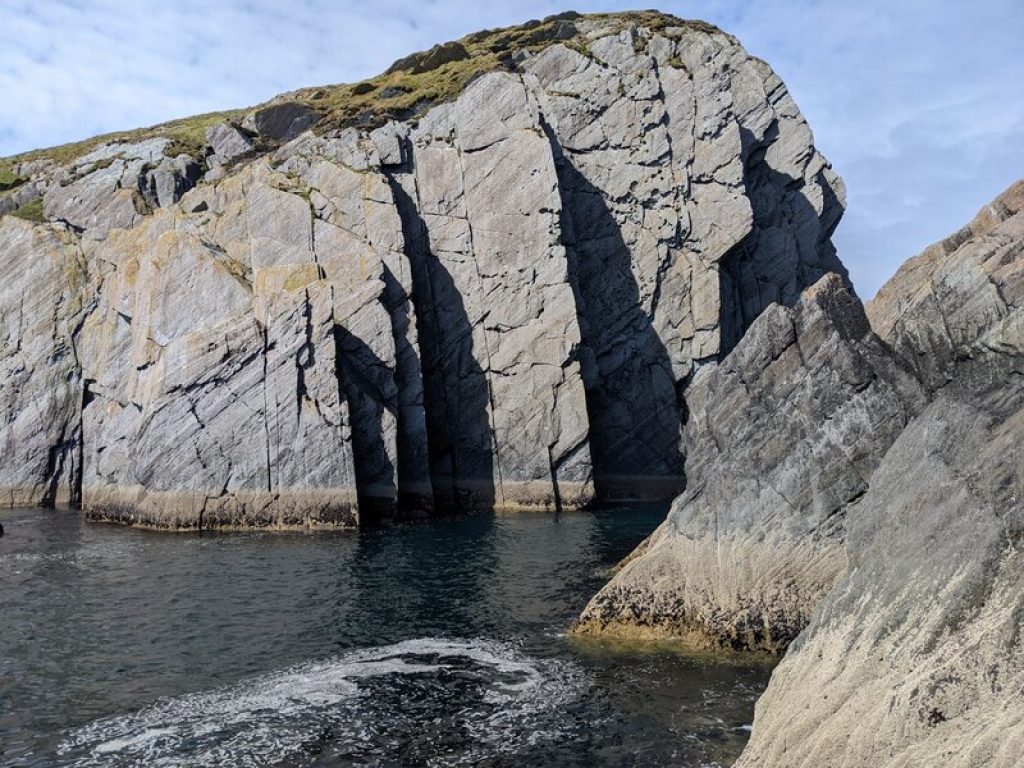
Typically more remote regions with steeper cliff faces and deeper waters are more prolific for pollock. Especially when fishing from the shore. In fact, all of the above pollock were caught at the same mark.
Is the UK good for pollock fishing?
The UK is notoriously good for pollock fishing and has some fantastic pollock fishing spots, particularly in its more remote regions. Southern Ireland and Scottish islands are notorious for huge pollock – the shore caught record stands at 18lb 4oz and the boat caught record stands close to 30lb – and, as a general rule, the deeper and more remote the better.
You can catch pollock from the shore on lures or from a boat with bait. They’re not fussy fish. But they are extraordinarily hard-fighting, exciting fish – hence their popularity.
How do you catch pollock?
Thanks to their aggressive nature you can catch pollock in several ways. Lure fishing from the shore can yield some huge double-figure pollock and – in the right location – can be seriously prolific. To target pollock on lures you need to seek out deeper water and take a multitude of different types of lures with you coupled with strong braid and abrasion-resistant leader material. We’d recommend fluorocarbon. Find the very best fluorocarbon fishing line here.
When targeting larger pollock on lures – and when trying to fish in a more ethical manner – use single hooks as opposed to trebles. Treble hooks are less effective at targeting larger fish as the individual hooks can bend and act as levers in the fish’s mouth. Of course, use barbless hooks too.
Whereas fishing for them from a boat can yield some even larger fish thanks to your ability to reach otherwise unreachable marks. Deeper, more structure-rich water tends to be where the biggest pollock hide.
The 7 Best Pollock Fishing Lures in 2023 Editor’s choice
What are the best methods to catch a pollock?
Targeting pollock with both lures and bait is incredibly effective. If you’re fishing from the shore and the conditions are suitable we recommend using lures because you can cover more ground and find where the pollock reside.
And you don’t need bait and a boat to target big fish. We have caught huge pollock from the shore on lures with a cast and retrieve method of lure fishing a few metres from the shore. Providing the water is deep enough this isn’t an issue.
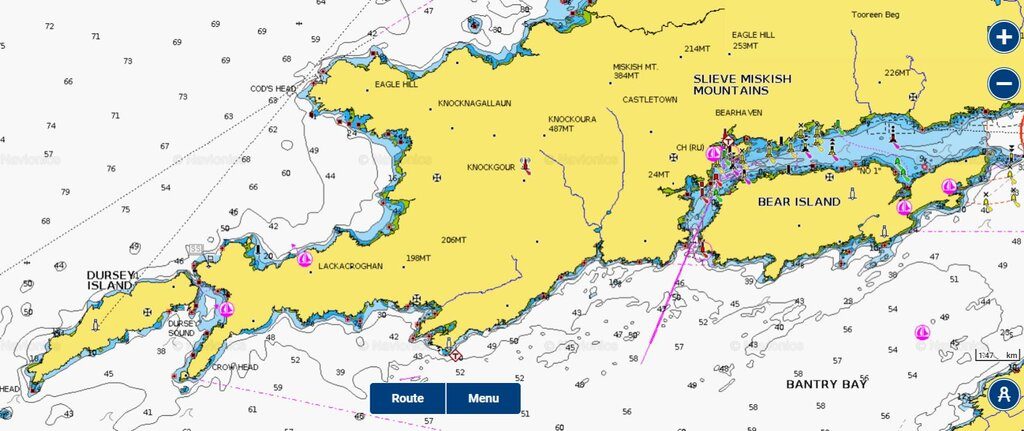
Cast and retrieve
When fishing for pollock with lures make sure you fish deep. Leave the lure to sink to the very depths and then steadily reel in. Pollock love a constant retrieve and will follow the lure right into the surface frequently. But you must fish from the bottom up.
Incidentally, bigger lures don’t necessarily lead to bigger pollock. This behemoth caught off the Beara Peninsula took a 28g Surf Seeker five metres from the shore. Although we should point out we were fishing a seriously remote point off the southerly tip of the Beara near Dursey Island.
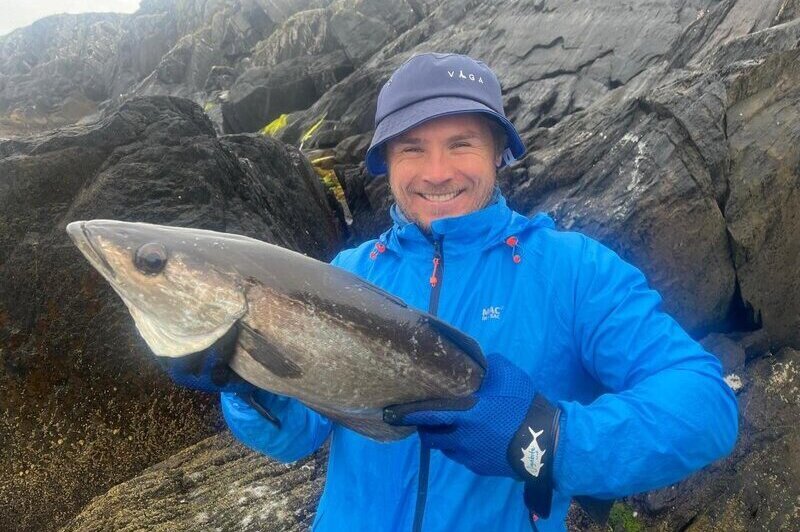
Fishing on Dursey Island
Bait fishing
Pollock are particularly unfussy eaters and feed on a plethora of crustaceans, smaller fish and almost anything present on the sea floor. Smaller pollock feed on plankton and – as they grow – they start to feed on sea floor crustaceans, worms and mussels, before graduating to bait fish like mackerel, sprat and squid.
Pollock tend to live in not only deep water but rougher seas. So if you’re fishing with bait make sure you use a weight heavy enough to keep the weight stable on the bottom.
Jigging
Whilst jigging is a form of lure fishing it’s completely different to a more traditional cast and retrieve style of lure fishing. Jigging is typically more effective when done from a boat as you let the lure sink to the bottom – or just off it – and then ‘jig’ it up and down. But if you are fishing on a ledge or dropoff then jigging can be really effective for pollock.
What are the best pollock-catching rigs?
For lure fishing, we would recommend using a traditional sea fishing lure rig. Braid attached to an abrasion-resistant leader using an FG knot. Then tying a lure clip onto your leader using a uni or Palomar knot. Simple and strong enough to pull through most snags.
If you’re bait fishing then something like a Paternoster rig works well for pollock fishing. Something with enough weight to stabilise the bait on the ocean floor, allowing it to gently rise up to just off the bottom.
When can you catch pollock in the UK?
You can catch pollock all year round in the UK. However, the best time to catch pollock in the UK tends to be late summer and early autumn. August / September tend to be the most popular months when it comes to fishing for large pollock in the UK.
Whilst pollock are non-migratory fish and stay in the same area for the majority of their lives, they do spawn offshore. In some cases miles offshore. And catching them in the spawning season – when the fish move to deeper water in the winter months – is much more of a challenge. Even if some smaller pollock stay nearer the shore until they’re ready to spawn.
Atlantic pollock spawn between November and February typically over rocky, structure-rich ground in deeper water miles offshore
FAQs
What is the best time of year to catch pollock?
The late summer, early autumn months of August and September are the best time to fish for pollock in the UK. This avoids the spawning season when the pollock go offshore to spawn in deeper waters.
What is the best time of day to catch pollock?
Typically dawn or dusk are the best time to fish for predatory fish as conditions are better suited to hunting than in bright daylight. However as pollock tend to live in much deeper water they are less reliant on hiding in the sun-specific shadows. So whilst dawn and dusk are still preferred fishing times, pollock – from personal experience – can be caught anytime.
What tide is best for pollock fishing?
Pollock can be caught in any tidal state, which is one of the best facets of pollock fishing. They’re much less tide-centric than bass and fishing the ebb and flood – from personal experience – has less of an impact.
However pollock – particularly big pollock – do turn on the hour before and after high tide. The slack tide does tend to cause a slow down in the feeding and movement of most fish and pollock are no different.
Can you catch pollock at night?
Yes you can catch pollock at night. Lower light conditions around dawn and dusk tend to be when pollock rise to the surface to feed. Likely a confidence thing. And nighttime is no different.
The pollock’s huge eyes and lifetime spent inhabiting the dingy depths means their eyesight is much better suited to dimmer conditions than most of their bait. So night provides a natural advantage.
What is the best bait for pollock?
The best bait for pollock does depend on the conditions and their traditional baitfish and time of year. But our personal favourites are:
- Mackerel
- Spratt
- Herring
- Squid
- Ragworm
- Crab
If peeler crab is in rich supply at a particular time of year, then that is an excellent choice. As mackerel migrate to UK waters from April onwards to spawn, it is an excellent seasonal bait.

Fishing in the Beara Peninsula
Tags: PollockSea Fishing
Hi, I'm Harry. A keen, albeit exceedingly average fisherman. I've spent the last few years trawling London's waterways with - if I'm being kind - varied success and would love to help you avoid the mistakes I have made.

